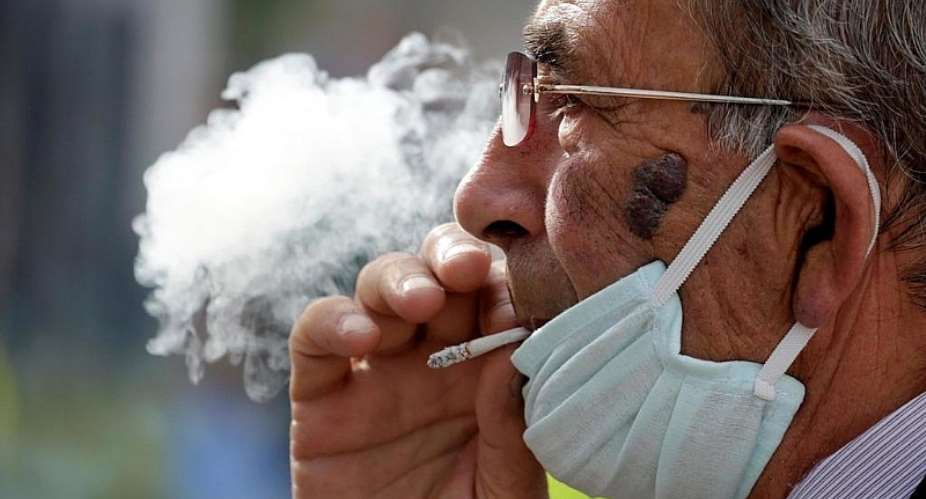Researchers studying Covid-19 patients in the Paris public hospital network have found some evidence that smokers could be better protected from the virus than others.
They have proposed a further study on nicotine's role in keeping the virus from taking over the body, though have warned against people taking up smoking, which carries other health risks
.Researchers from several institutions looked at 482 patients at the Pitié-Salpêtrière hospital in Paris who tested positive for Covid-19, and found that their smoking rate was much lower than the general French population, where 25.4 per cent of people report smoking daily.
Of the group, 343 were hospitalised for serious complications and had a smoking rate of 4.4 per cent, and 139 were sent home with less serious symptoms, with a smoking rate of 5.3 per cent.
This surprising finding prompted further investigation, and accounting for age and sex, the researchers found that the small number of smokers appeared to have had some kind of protection against the virus.
Smokers could be protected
The study “confirms that active smokers are protected against the Sars-Cov-2 infection,” writes the press release. “The reasons for this protection are not established, but nicotine could be a candidate.”
The researchers warn that people should not take up smoking, as it carries health risks and smokers who become infected with Covid-19 often develop more serious symptoms because of the effect of tobacco smoke on the lungs.
The head of France's national health agency, Jerome Salomon, said the nicotine link is only an unproven hypothesis at this stage, and warned that smoking remains the number one killer in France, with 75,000 people who die of smoking-related complications each year.
How would it work?
In an upcoming article (in pre-print here) researchers write: “Although the chemistry of tobacco smoke is complex, these data are consistent with the hypothesis that its protective role takes place through direct action on various types of nAChRs [nicotine receptors] expressed in neurons, immune cells (including macrophages), cardiac tissue, lungs, and blood vessels.”
In other words, nicotine could block the virus from entering the body through neurons in the olfactory system or through lung cells.
The hypothesis remains to be proven. The researchers are looking to organise a clinical study using nicotine patches, pending approval from French health authorities.
The study would have three aims: to see if nicotine prevents infection in healthcare workers; to see how it works therapeutically and to lower symptoms in hospitalised patients; and to see its effect on patients in intensive care.





 Galamsey: Five Burkinabes jailed 20 years each for mining
Galamsey: Five Burkinabes jailed 20 years each for mining
 'It's no crime' – Abu Sakara defends Alan's exit from NPP
'It's no crime' – Abu Sakara defends Alan's exit from NPP
 'We know all your houses, pay your bills now or we’ll disconnect you; we're all ...
'We know all your houses, pay your bills now or we’ll disconnect you; we're all ...
 Impacts of air pollution extremely dire – Clean Air Fund
Impacts of air pollution extremely dire – Clean Air Fund
 Lofortoe Chief gives one week ultimatum to Fulani herdsmen to vacate
Lofortoe Chief gives one week ultimatum to Fulani herdsmen to vacate
 2024 elections: A vote for Mahama will turn Ghana's education system upside down...
2024 elections: A vote for Mahama will turn Ghana's education system upside down...
 Dumsor: NPP will be punished in election 2024 if gov't doesn't address current s...
Dumsor: NPP will be punished in election 2024 if gov't doesn't address current s...
 Akufo-Addo directs GRA, Finance Ministry to renegotiate deal with SML
Akufo-Addo directs GRA, Finance Ministry to renegotiate deal with SML
 Kofi Bentil’s love, support for Bawumia will never represent IMANI – Franklin Cu...
Kofi Bentil’s love, support for Bawumia will never represent IMANI – Franklin Cu...
 NPP outperforms NDC in health infrastructure in Ashanti Region — LIPS report
NPP outperforms NDC in health infrastructure in Ashanti Region — LIPS report
